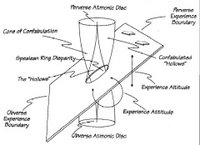April 1, 2006
Permanent Records
 Today I presented last year’s bioport Part II paper to the 2nd annual Cultural Studies conference at Teachers College.
Today I presented last year’s bioport Part II paper to the 2nd annual Cultural Studies conference at Teachers College.
Permanent Records: Personal, Cultural, and Social Implications of Pervasive Omniscient Surveillance
I think the distilled version of this model if far more digestible and accessible than the papers.
One of my co-panelists is doing some really interesting work with urban
youth in the bronx, and gathering incredible interview materials about
the perceptions of surveillance by these youth, and their forms of
resistance. These stories might help convey the violence of a
surveillance society.
The conference format was a bit disappointing. I can barely believe academics still read their papers to each other at conferences – there are so many things that Open Source does right, including, knowing how to throw a great conference. Even the variety of presentation formats is an idea that needs to spread – BOFs, lighting talks, presentations and posters all create different spaces and dynamics for interactions between participants. The traditional model is so intimidating that it seems like many people are discouraged from participating.
More importantly, the social justice issues and governance models that are being explored by F/OSS projects are really important for the Cultural/Critical studies folks to be considering. It is also shocking how disconnected they are from the freeculture movement, and its theoretical roots. Arguably, the freeculture movement is a shadow struggle, mirroring the struggles for sustainability, and against globalization and the logic of capitalism being conducted in the physical world. But, it may also represent the actual ground on which that struggle is being conducted.
 Filed by jonah at 1:13 am under air,fire,metaphysics
Filed by jonah at 1:13 am under air,fire,metaphysics
 4 Comments
4 Comments


As one who attends a lot of open source/hacker conferences and academics ones, it is a shame that academic ones don’t mix it up a little more as do the developers cons. It was for this reason that I am extra-excited that 4S has now moved to mixed formats, including:
************
Some sessions at the Vancouver 4S will be designated “working sessions” for which papers will be available online in advance, and allotted time will be primarily for discussion. If you would like to organize a working session please contact Josh Greenberg, Tarleton Gillespie , or Sergio Sismondo
Some sessions at the Vancouver 4S will be designated “new media”. If you would like to organize a session or participate in one please contact Linda Layne.
****
4S so far as been one of my favorite conferences (and you should consider presenting there, folks dig open source there), and these new varied formats are an extra boon.
As per “reading from papers” I am mostly against it unless it is done well, and it is usually not done so at least 50% of the time (it is hard to write as if you are talking, we rarely do that type of writing). I appreciate it because the presenter can offer a more nuanced point but usually the presentation becomes to monotone to follow. Since it is expected where I present, I usually do so, but with a lot of free flow talking spread throughout.
biella
[…] But there is another freedom at stake here – one I have explored in the past (permanent records) – the freedom to remain anonymous, which is the keystone supporting personal privacy, which I am beginning to believe ought to be a basic human right. I started thinking about how these laptops could easily become the instruments for an international id program, and for all the reasons that people are concerned about this, OLPC should seriously consider shipping with tools which support anonymous network activity. Tools like TOR, which regrettably the EFF has just had to cut funding for… If you think this is important, perhaps you might want to chime in, and let laptop people know. […]
[…] However, there is another important angle to this story relating to the relationship between anonymity and freespeech, especially in a world of omniscient surveillance. […]
[…] Pervasive Omniscient Surviellance will have an impact on the basic fabric of personal social and cultural interactions as we currently understand them. […]